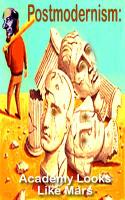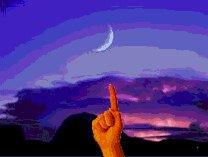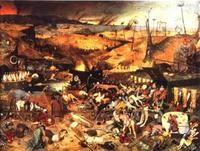
 |
Memes are analogues for genes, which is to say they are analogues for natural selection. The two may reinforce one another or come into competition. Celibacy is a meme but as a gene has no biological survival value, although culturally it may have such value. Priests or nuns transmit the meme to young boys or girls who are trying to make a life choice. Suppose the celibacy meme made better priests and nuns because they are not distracted by family duties. If this supposition is true, then celibacy does have better cultural survival value. On the other hand, a gene for celibacy almost by definition would not produce celibate offspring. Rather, no offspring would ensue from it.
Like genes, memes rest on one fundamental principle. All life evolves by varying survival abilities of replicating entities.
When we die we leave behind memes and genes. Of the two, our genes will be forgotten in three generations. Our child, maybe our grandchild, can bear a resemblance to us in face or musical talent, but our characteristics soon become negligible in succeeding generations. If we have memes such as Shakespeare's we become part of deathless literature. The same can be said for Einstein, Socrates, or Leonardo da Vinci.
Dawkins and other meme theorists regard religious memes as dangerous to human futurity. The idea of God is a particularly strong meme, and has persisted from before recorded history until the present day. It has extremely high survival value. According to Dawkins, its survival results from its psychological appeal. He says that it "provides a superficially plausible answer to deep and troubling questions about existence. It suggests that injustices in this world may be rectified in the next. . . . God exists, if only in the form of a meme with high survival value, or ineffective power, in the environment provided by human culture."
Here, Dawkins is bent by his Western understanding. Some, as in Christianity and Islam, claim to have the one true meme. It and it alone must be propagated at the risk of damnation by God. He doesn't understand that Buddhist memes make no claim to exclusivity and Hindu memes espouse tolerance.
When Dawkins says religious memes provide "a superficially plausible answer to deep and troubling questions about existence," he reveals a rather rudimentary understanding. Superficially plausible? Without Dawkins' intensive study, meditation, and effort, Buddha's teachings would not be immediately accessible to him because Buddha speaks of the quality of various experiences. Science tends to ignore the qualities of experiences and assumes all experience to be the same for its purposes. Once studied, pondered, and filtered through life experiences, the implications of Buddha's teachings open an entirely new way of seeing, one which reveals the flaws in conventional world views, particularly those which assume all experience is equal and only objective observation is necessary. Those views are superficial. (See the discussion of experience quality in Cartesian anxiety: Francisco Varela, 6 January.)
Dawkins would attach little or no credence to people such as Nisargadatta, Ramana Maharshi, or medieval Germans, Meister Eckhart or Jacob Boem as they all spoke about what might be called the "God meme." The single interesting facet of their contribution has much to do with all memes, however.
Each of them, Nisargadatta, Maharshi, Eckhart, and Boem, said that human beings can reach a point when mimesis is realized as empty phenomena. That is, they observed that the mind replicates as its natural function, but that this replication can be seen through.
This implies that the "God meme" has a basis not in superstition, but in an intuitive, innate human recognition, a recognition that mimetics derives from the source of all memes. To determine that, of course, Dawkins and others must learn attitudes, mental skills and concentration currently unknown to them; they must stop theorizing and immerse themselves in an initially alien perspective in order to experience directly whether the "God meme" is superstition or not.
From memes to genes. Dawkins would have no problem if I said that individual organisms, "selfish" or not, reveal a compulsion to perpetuate their genes and that this compulsion is a dynamic of biological regularities not apparent in an isolated system. The dynamic cannot be described in terms of DNA biochemistry. In fact, no definitive explanation can be found in any isolated system. Yet we observe among organisms the selfish gene, as Dawkins calls it.
Would he have a problem if I replace "a compulsion to perpetuate their genes" with a phrase about a compulsion to seek God? The only difference between accepting one statement and rejecting the other is not logic but mind set.*
____________________________________
* ". . . I have never found it possible to dismiss the content of religious thinking simply as simply part of an outmoded phase in the consciousness of mankind. . ." Werner Heisenberg, Physics and Beyond
Meme theory is not a science, nor at present has much chance of becoming one, although it does provoke stimulating and lively discussion.













